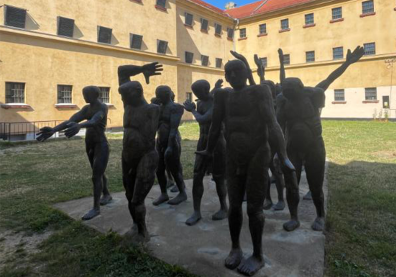Political carcerality(ies) in Central, Eastern and Balkan Europe (20th-21st c.)

Scientific event summary
Conflicts and/or sudden, radical transformations of political regimes towards authoritarian experiments - a reality that particularly concerns Central, Eastern and Balkan Europe in the 20th century - are conducive to the emergence of political prisoners, From the revolutionary communist experiments at the end of the First World War, to the advent of fascist or dictatorial regimes in the 1930s, to the Sovietization of a large part of Europe after the Second World War. Depending on the situation or period under consideration, political carcerality can take a wide variety of forms.
Total or partial deprivation of freedom of movement is one of the most common means of political repression. Whether it takes the form of strict relegation or house arrest, and whether or not it is coupled with ill-treatment, it responds to a power's need to limit the effects of dissent on the social and political body over which it exercises its authority.
Discussions will examine the practices and conditions of political carcerality, as well as cases of assistance and solidarity towards political prisoners, the exploitation and uses of carcerality, its political and geopolitical stakes and, finally, its imaginaries and narratives.
Scientific event program
Thursday, November 6th, 2025 from 2.10pm to 4.30pm at Inalco
Maison de la Recherche - Auditorium Dumézil (2 rue de Lille Paris 7e)
1.45pm-2.10pm: Coffee reception.
2.10pm-2.20pm : Welcoming remarks: Étienne Boisserie and Christine Manigand.
2.20pm-2.30pm : Presentation of the day: Matthieu Boisdron and Lucie Raskin.
2.30pm-4.30pm: 1re session: Practices and conditions of political carcerality.
Chair: Jana Vargovčíková
- Audrey KICHELEWSKI: Conditions of detention for "fascisto-Hitler criminals" in 1960s Poland (20 min).
15:10-15:20: Break.
- Charlotte VILLARD: Political relegation in Albania during the Communist dictatorship: between control of social space and the collective experience of deportees (20 mn).
- Oksana MITROFANOVA: Political prisoner(s) of members of the Ukrainian Helsinki Group (20 mn).
Questions, exchanges, discussion (20 mn).
Friday, November 7th, 2025 from 9.30am to 6pm at Inalco
Maison de la Recherche - Auditorium Dumézil (2 rue de Lille Paris 7e)
9.am-9.30am: Coffee reception.
9.30am-10.50am: 2e session: Assistance and solidarity towards political prisoners.
Chaired by: Isabelle Davion
- Clarisse BROSSARD: Moyshe Zilberfarb, from socialist revolutionary to enemy of the people: the prison tale of a Ukrainian Minister of Jewish Affairs (20 mins).
- Gergely FEJERDY: Otto of Habsburg, spokesman for political prisoners through an examination of the particular case of Cardinal Mindszenty(20 mn).
- Francesca PIANA, Anna SHAPOVALOVA: Care for political prisoners: the ICRC's missions in the USSR between the wars (20 mn).
Questions, exchanges, discussion (20 min).
10.50am-11am: Break.
11am-12.30pm: 3th session: Exploitations and uses of political carcerality.
Chair: Irina Gridan
- Florin ȚURCANU: The experience of political carcerality in the years 1933-1944 as a source of legitimation and mythologization of the Romanian Communist leadership through the example of Gheorghiu-Dej (20 min).
- Alexandru GUSSI : The status of former political prisoner, a means of political legitimization during Romania's democratic transition: the case of Corneliu Coposu (20 mn).
- Florent PARMENTIER: Political carcerality and the fabrication of public figures in Moldavia: between elite struggles, Transnistrian conflictuality and political memory (20 mn).
Questions, exchanges, discussion (20 mn).
12.30pm-2:30pm: Lunch
2:30pm-15.50pm: 4thsession: Political and geopolitical issues of political carcerality.
Chair: Christine Manigand
- Guillaume MINEA-PIC : Political diasporas in competition? Constructing knowledge and critique of the Soviet prison regime in the 1920s (20 min).
- Paul LENORMAND: Captivity in coalition or how to imprison your allies. Czechoslovakians facing Soviet carcerality, 1939 - 1950s (20 mn).
- Paweł SĘKOWSKI : The "mania for espionage" within the Polish Workers' Party/Polish United Workers' Party during the period of Stalinism in Poland (1948-1956): communists imprisoned by communists (20 min).
Questions, exchanges, discussion (20 min).
3.50pm-4pm: Pause.
4pm-5.20pm: 5th session: Imaginaries, aesthetics and narratives of political carcerality.
Chair: Anne Madelain
- Alexis CHRISTODOULOU : "The sea encircles us like a terrible chain". A sociological reading of the written testimonies of Greek political deportees on the islands in the 1930s(20 mins).
- Andjela RADONJIC: The women of the Goli archipelago (20 mins).
- Mathieu LERICQ : Naissance d'un imaginaire critique de la carcéralité stalinienne en Pologne : L'Interrogatoire de Ryszard Bugajski, 1981 (20 mn).
Questions, exchanges, discussion (20 mn).
5.20pm-5.30pm : Pause.
5.30pm-5.45pm : Conclusions.
6pm: End of event.
Organization
- Matthieu Boisdron (SIRICE, Nantes Université)
- Lucie Raskin(CREE, Inalco)